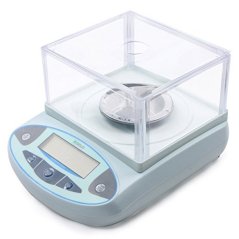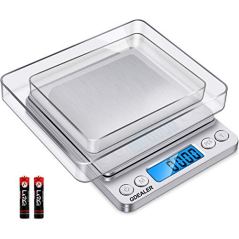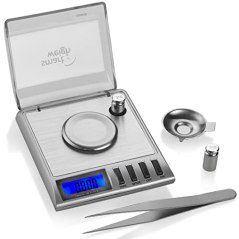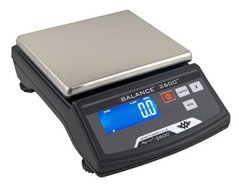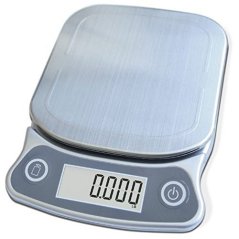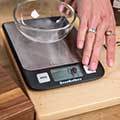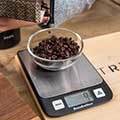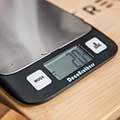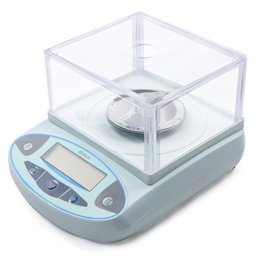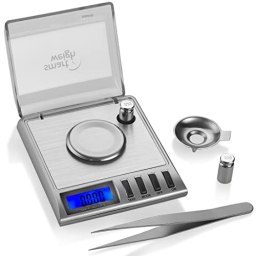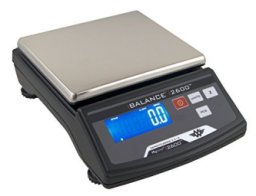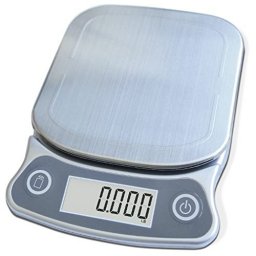Buying guide for best precision scales
If you’re a cook, online merchant, jewelry retailer, or techie, you need a helping hand when it comes to measurements. Accuracy is of the utmost importance if you want to make sure recipes are successful and postage is correct to avoid returned parcels. That’s why investing in a precision scale is a smart choice for saving time and money.
Precision scales measure minuscule amounts that would otherwise be impossible to judge, or at the very least, obtain an accurate reading. These nifty scales can tell you the weight of an object within 0.0001 gram in most models. With more accurate calculations, you’re able to track your food intake better, provide better prices for customers, and measure ingredients to avoid cooking disasters. You can even bring some precision scales with you because these devices range from pocket-size to about a foot wide for use on countertops.
Key considerations
Types of precision scales
Tabletop: Tabletop scales are the most common precision scales and are generally used in cooking or for weighing parcels for postage. Only some models come with containers that fit over the scale platform, so if yours is a platform-only model, you’ll need to use bowls or food storage containers.
Pocket: Pocket scales are the compact version of precision scales. These are used to measure food and medication on the go, though they have a variety of applications. As the design is stripped down to the bare essentials, you’ll need to use your own container to measure items.
High-precision: High-precision scales have the highest level of accuracy and even come with their own calibration weights. Many are around the same size as pocket scales, but there are larger models also available. These are used most often to measure gold and silver jewelry, though they’re also used to measure other small items like beads and spices. It’s not unusual for these sets to come with their own tweezers for placing items on the platform.
Measurements
Precision: Depending on how precise the scale is, you can get one that measures to 0.001 gram. With that said, if you’re looking for that level of accuracy, you’ll need either a high-precision scale or a laboratory-grade precision scale.
Units of measure: Simple precision scales measure ounces, grams, pounds, and kilograms. More advanced units also measure carats, grains, and deadweight tonnage.
Weight limit: Every precision scale has a weight limit, and you risk breaking the scale if you place heavier items on it. Tabletop scales can hold the most weight, with some capable of holding up to 20 pounds. Some high-precision scales can only handle up to 20 grams.
Digital screen
Precision scales have digital screens, some of which are backlit LED screens. The screen menu is limited because it only conveys measurements and indicates modes. This area is the hardest to keep clean, especially if you’re using scales to measure food or dry ingredients. You’ll need to clean it gently because excessive pressure could cause the screen to break.
Power source
Most precision scales operate on AA or AAA batteries, though some have an AC adapter. An initial set of batteries typically comes with the package, but these batteries are usually off-brand and won’t last too long. Another thing to keep in mind when examining the power source is how easy it is to change the batteries. Several scales have a panel that simply pops open, whereas others are screwed on and require tools to remove the panel.
Expert Tip
Gently place the precision scale on the counter. Avoid dropping or tilting it to make sure all the internal components function without corruption.
STAFF
BestReviews
Precision scale features
Automatic shutoff
Some precision scales can automatically shut off. This is ideal, especially since it’s easy to drain the battery if the device is accidentally left on. Certain units have the automatic shutoff already programmed into the scale, while you’ll need to turn it on in others.
Containers
Certain tabletop scales come with containers in different shapes and sizes to accommodate various contents. Smaller containers are ideal for measuring single portions of fruits, nuts, and vegetables, while larger ones can measure dry ingredients like flour for baking. These tend to be deeper to account for the larger volume.
Macro tracking
There are select precision scales that track macronutrient levels in addition to the total food or ingredient weight. These scales have nutritional information programmed in, which displays on a separate screen on the scale. This type of scale is helpful if you’re tracking proteins, vegetables, fruits, and grains, but it won’t provide units for recipes and food that’s already cooked.
Expert Tip
If you don’t plan on using the precision scale often, it’s a good idea to remove the batteries after each use. Old batteries can bleed, and if they do, you’ll need to replace the entire unit.
STAFF
BestReviews
Precision scale prices
Precision scales cost between $10 and $100, though laboratory-grade models cost well over $200.
Inexpensive: For $10 to $30, you can find modest precision scales for measuring food, though they’re not accurate with smaller measurements. Many pocket-size units also fall in this price range.
Mid-range: In the $30 to $60 bracket, there are more accurate food scales with advanced features like a Power Save mode or built-in nutrition database.
Expensive: For $60 to $100, you can find high-quality precision scales with unparalleled accuracy suited for retail and commercial use.
Expert Tip
Clean the LCD screen of your precision scale with a dry cotton swab, especially around the edges and corners. It’s easy for food particles to build up in those places.
STAFF
BestReviews
Tips
- Give one to a baker. Precision scales are ideal for measuring dry ingredients for baking.
- Wipe down the platform. After each use, keep particle accumulation at bay by wiping the platform with a dust-free cloth.
- Watch the weight. Every precision scale has a weight limit, and if you exceed it, you could cause internal components to malfunction.
- Double-check units. Make sure your precision scale is set to the correct unit of measure before weighing anything.
- Improve your nutrition. Eating in moderation begins with knowing the amount of food you’re eating, and a precision scale can help you prepare the correct amount.
- Calculate postage. If you’re an independent online seller and ship products from your home, streamline the process by using a precision scale to calculate postage and then print it at home. You’ll save time and money.
Other products we considered
If you’re looking for a simple precision scale to measure food for healthy cooking, we like the AmazonBasics Digital Kitchen Scale. It’s a great choice at a budget-friendly price, considering it can measure between 2 grams and 11 pounds and is equipped with sensor technology to deliver quick readings. With a stainless steel platform and large LCD display, it’s sure to last for years.
For a pocket-size precision scale, we like the Fuzion Digital Pocket Scale, which has a measuring range of 0.1 gram to 1,000 grams. It’s ideal for those who need to measure food or medicine on the go. There’s no need to carry instructions for this one because they’re printed inside the lid. It even has an auto-shutoff mode to save your battery when you forget to turn it off or if it accidentally turns on in your pocket.
FAQ
Q. My precision scale has a Tare button. What’s it for?
A. If you set the scale to zero and then place the container on it, you’ll notice it measures the weight of the container before you place anything in it. When you press the Tare button, your scale automatically resets to zero, so that the scale will only weigh the items you place in the container.
Q. How do I add dry ingredients like flour or sugar to a precision food scale without making a mess?
A. You can place a sheet of plastic wrap over the scale container before pouring in each dry ingredient. Each ingredient will be neatly packaged, and you won’t have excess particles in subsequent measurements. Best of all, you only need to wipe down the container once when you’re done measuring.
Q. What’s the best place to store my precision scale?
A. Store your precision scale in a drawer or cabinet with ample space. Make sure there’s nothing around it that could fall or lean on the scale, because that could affect its accuracy. You might want to store it in a bag or storage container to keep it free of dust.


